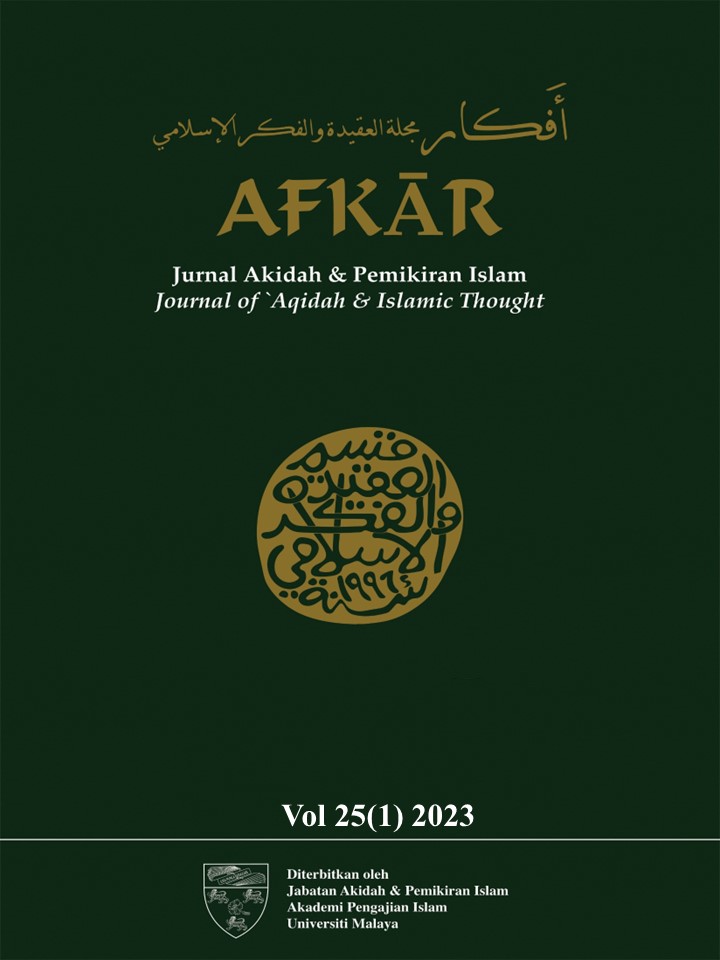Ideologi Kesamarataan antara Lelaki dan Wanita Berdasarkan Perspektif Naqli dan Neurosains The Ideology of Equality between Men and Women Based on the Perspectives of Naql and Neuroscience
Main Article Content
Abstract
The strife for equality between men and women is an ideology that has long been propagated by feminists. Among the equalities being propagated is women’s ability to use common sense at par with men to the extent that they proclaim some of the Qur’anic verses and hadiths related to women as irrelevant. To them, the prescribed texts seem to degrade women. To dispute this ideology, the classic and also the present scholars of Islam presented arguments to disprove the notion by the feminists. However, in rebutting this ideology, arguments based on the neuroscience perspective are yet to be discovered. Therefore, this article will incorporate the arguments from the perspectives of naqli (the Qur’an and Hadith) and neuroscience in terms of the different aspects of male and female brain function. This study employs qualitative methods through content analysis of Qur’anic texts, ahadith and neuroscience facts. The findings show that there are differences in the structure and function of the male and female brains. Consequently, there is no such ideology of equality due to the differences in the structure and function of the male and female brains that correspond to their roles and complement each other. It is hoped that this finding will enhance the public understanding that Islam glorifies women and that their obligations as caliphs on this earth are in accordance with their nature, either from the biological, psychological and emotional regards.
Downloads
Article Details

This work is licensed under a Creative Commons Attribution-NonCommercial 4.0 International License.
References
Abdussalam Muhammad Shukri et al.. “Sisters in Islam’s Quest for the Reinterpretation of the Qur’an and Hadith: An Analysis of Their Views on Equality, Women Judges, and Polygamy.” Jurnal Kajian Malaysia 32(1) (2014): 55-80.
AD. Eridani. Modul Pengkaderan Ulama Perempuan: Perspektif Kesetaraan. Jakarta: Rahima, 2011.
Al-Mawardi, Abu al-Hasan ‘Ali bin Habib. Al-Ahkam al-Sultaniyyah wa al-Wilayah al-Diniyyah, ed. Ahmad Mubarak al-Baghdadi. Kuwayt: Maktabah Dar Ibn Qutaybah, 1989.
Amina Wadud. Qur’an and Woman: Reading the Sacred Text from a Woman’s Perspective. New York: Oxford University Press, 1999.
Anderson, Pamela Sue. A Feminist Philosophy of Religion: The Rationality and Myths of Religious Belief. Oxford: Blackwell Publishers, 1998.
Baron-Cohen et al.. Understanding Other Minds: Perspectives from Developmental Social Neuroscience. Oxford: Oxford University Press, 2013.
Bell et al.. “Males and Females Differ in Brain Activation during Cognitive Tasks.” Neuroimage 30(2) (2006): 529-538.
Biemiller A, Meichenbaum D.. The Nature and Nurture of the Self-Directed Learner: The Evolution of Cognitive Behavior Therapy. t.tp: t.p, 2017.
Borgatta, E. F. & Montgomery, R. J. V.. Encyclopedia of Sociology 2. New York: Macmillan Reference, 2000.
Hamka. Tafsir al-Azhar. Batu Caves: PTS Publishing Sdn Bhd, 2017.
Harees, Lukman. The Mirage of Dignity on the Highways of Human ‘Progress’: The Bystanders’ Perspective. Bloomington: AuthorHouseUK, 2012.
Ibn Hazm al-Andalusi al-Qurtubi, Abu Muhammad ‘Ali bin Ahmad. Al-Fasl fi al-Milal wa al-Ahwa’ wa al-Nihal. Kaherah: Maktabah al-Khanji, t.t.
Ibn Kathir, Abi al-Fida’ Isma‘il bin Kathir. Tafsir al-Qur’an al-‘Azim. ed. al Arnaut, ‘Abd al-Qadir. Riyadh: Dar al-Salam, 1994.
Ingalhalikar, Madhura et al.. “Sex Differences in the Structural Connectome of the Human Brain.” Biological Sciences 111(2) (2013): 823-828.
KH. Husein Muhammad et. al.. Dawrah Fiqh Perempuan Modul Kursus Islam dan Gender. Cirebon: Fahmina Institute, 2006.
Mc Ewen B. S. & Milner T. A.. “Understanding the Broad Influence of Sex Hormones and Sex Differences in the Brain.” Journal of Neuroscience Research 95 (2017): 24-39.
Mernissi, Fatima. Women and Islam: An Historical and Theological Enquiry. Oxford: Basil Blackwell, 1991.
Muslim bin al-Hajjaj. Sahih Muslim. Riyadh: Dar al-Salam, 1419H.
Mutawakil, M. Hajir. “Keadilan Islam dalam Persoalan Gender.” Jurnal Kalimah: Jurnal of Religious and Thoughts 12(1) 2014: 67-90.
Najah et al.. “Wanita dan Pengurusan Emosi Melalui Pengkisahan Maryam dalam al-Quran.” International Journal of Islamic Thought 17 (2020): 90-100.
Norzulaili Mohd Ghazali et al.. “Gerakan Pejuang Hak Wanita dan Metodologinya dalam Memahami Quran dan Sunnah: Kajian Terhadap Pertubuhan Sisters in Islam.” Laporan Penyelidikan USIM PPPP (D)/2006.
Paizah Ismail. Wanita, Status Sosial & Undang-undang Islam. Shah Alam: Karya Bestari Sdn. Bhd, 2010.
Puteri Islam (SIS). Adakah Wanita dan Lelaki Saksama di sisi Allah. Kuala Lumpur: SIS Forum Malaysia Bhd, 1991.
Al-Qardawi, Yusuf. Min Fiqh al-Dawlah. Mesir: Dar al-Shuruq, 2005.
Al-Qardawi, Yusuf. Wanita dalam Masyarakat Islam Menurut al-Quran dan as-Sunnah. Kuala Lumpur: Al-Hidayat Publishers, 2002.
Al-Qardawi, Yusuf. Markaz al-Mar’ah fi al-Hayat al-Islamiyyah. Kaherah: Maktabah Wahbah, 1996.
Qutb, Sayyid. Fi Zilal al-Qur’an. Beirut: Dar al-Shuruq.
Rahimin Affandi Abd Rahim. “Persoalan Gender di dalam Perundangan Islam di Malaysia: Suatu Analisis Ringkas”. Dalam Wanita dan Perundangan Islam. ed. Raihanah Abdullah. Petaling Jaya: Ilmiah Publishers Sdn. Bhd., 2001.
Al-Razi, Muhammad Fakhr Din. Tafsir al-Kabir. Beirut: Dar al-Fikr, 2005.
Rozi Bainon. Wanita: Penghapusan Diskriminasi dari Perspektif Islam dan Undang-Undang Malaysia. Kuala Lumpur: Dewan Bahasa dan Pustaka, 1999.
Ruigrok et al.. “A Meta-Analysis of Sex Differences in Human Brain Structure”. Neuroscience and Biobehavioural Reviews (2014): 34-50.
Siti Musdah Mulia. “Allah hanya Melihat Taqwa, bukan Orientasi Seksual Manusia”. Jurnal Perempuan 58 (2008): 122-127.
Al-Zarqani, Muhammad ‘Abd al-Azim. Manahil al-‘Irfan fi ‘Ulum al-Qur’an. Beirut: Dar al-Kutub al-‘Arabi, 1988.
Al-Zuhayli, Wahbah. Al-Tafsir al-Munir: Fi al-‘Aqidah wa al-Shari‘ah wa al-Manhaj. Beirut: Dar al-Fikr, 1991.

